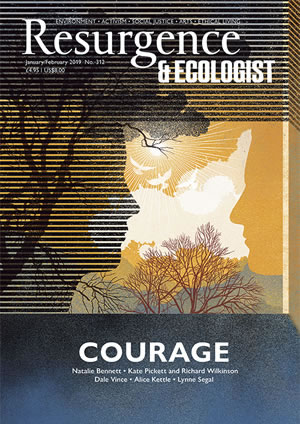Hans Schuierer is regional administrator in a thinly populated area of northern Bavaria (Oberpfalz). In 1981 coal mines closed and the regional economy collapsed. The film opens with Schuierer’s message of stoical endurance going down badly at a (Social Democratic) party branch meeting. The minister for the environment arrives shortly afterwards from the state capital, Munich. Schuierer cannot believe his luck when the minister reveals that Wackersdorf is to be the site for an industrial project that will secure “at least 3,000 jobs”.
So begins this cinematic version of one of Germany’s bitterest environmental disputes in recent history. The ‘project’ turned out to be a nuclear waste reprocessing plant. 130 hectares of forest were cleared and a 5-metre-high fence was erected around the site. Three people were killed in the protests that followed.
Wackersdorf took seven years to make, mainly because of difficulties finding money. The director is from the Oberpfalz. The producer is a veteran of the protests. They were on a mission, and the film’s release has turned out to be timely. The Greens doubled their share of the vote in Bavaria in recent elections and have polled well in Belgium and the Netherlands.
According to its director, the film is about a man changing his mind, but Schuierer’s is a change of heart as well as mind, and it’s his feeling for place that does much of the persuading. The texture of small-town life is handled superbly. Local reservations about the plant’s safety are at first smugly dismissed. Then Schuierer’s daughter’s maths teacher has doubts, which she passes on to her father. The funniest scene occurs in the town library, where Shuierer goes to inform himself. He is not at all sure he wants anyone to know what he’s looking for, but the librarian is keen to show off the new cataloguing system. “Keyword?” she asks, sitting him before the computer screen. Pause. “Atomic energy.” “For or against?” Pause. “Both.”
Food, oddly, matters in this film. The visiting minister attempts one-upmanship through a ‘casual’ discussion about Weisswurst, a Bavarian speciality. Plain fare and home truths around the kitchen table are contrasted with a Munich restaurant where the waiters speak French and a Mephistophelian industry advocate works his charm.
Schuierer does change his mind. He chooses the flask of home-made Schnaps shared at a bus stop over luminous white tablecloths and elaborate starters. And the strength of the film is that none of this is peripheral: he makes the decision by taking his surroundings more seriously – everything from the wood he walks in to what his daughter is telling him.
At first he finds himself isolated. In wavering over the plant, he loses both his friends and his party’s backing. When he informs the state government that he will not sign the deal, the law is changed to make his signature unnecessary. If he joins the protesters it must be as an ordinary citizen – a decision he is vain enough, and human enough, to hesitate over.
He does join. The protests build, and 10 billion squandered Deutschmarks later the project is abandoned.
This is a film about one of those left-behind places that have returned such perplexing electoral results all over Europe lately. Wackersdorf found a way to challenge the alliance of government and big business, not by taking to cheap political intoxicants, but through a well-informed civil society initiative. “Aufruhr! Widerstand! Es gibt kein ruhiges Hinterland!” (approximately: “Raise a riot! Time to resist! Quiet rural corners do not exist!”) cry the protesters.
In Wackersdorf that cry won the day. May it do so again now, in other ‘out-of-the-way places’.






